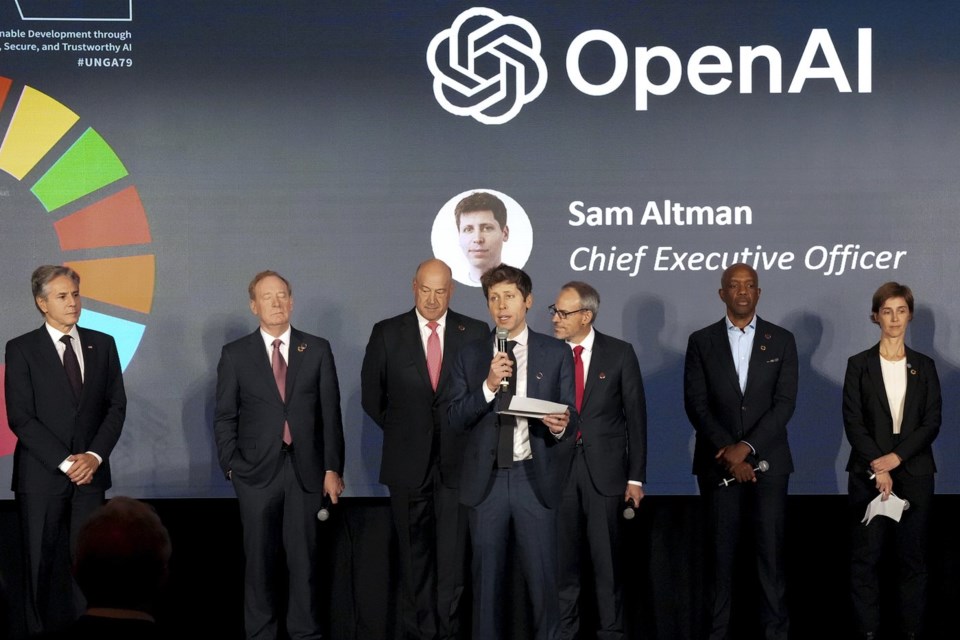OTTAWA — A coalition of Canadian news publishers is suing OpenAI for using news content to train its ChatGPT generative artificial intelligence system, saying the company breaches copyright by "scraping large swaths of content" from media websites.
"OpenAI is capitalizing and profiting from the use of this content, without getting permission or compensating content owners," the coalition said in a statement Friday.
The coalition, which includes The Canadian Press, Torstar, The Globe and Mail, Postmedia and CBC/Radio-Canada, said the companies invest hundreds of millions of dollars into journalism, and that content is protected by copyright.
"News media companies welcome technological innovations. However, all participants must follow the law, and any use of intellectual property must be on fair terms," the statement said.
Generative AI can create text, images, videos and computer code based on a simple prompt, but the systems must first study vast amounts of existing content.
OpenAI said in a statement that its models are trained on publicly available data. It said they are "grounded in fair use and related international copyright principles that are fair for creators and support innovation."
The company said it collaborates "closely with news publishers, including in the display, attribution and links to their content in ChatGPT search" and offers outlets "easy ways to opt-out should they so desire."
Paul Deegan, the president of publishers' group News Media Canada, whose members include some of the outlets behind the lawsuit, accused AI companies of "strip-mining journalism" while unlawfully enriching themselves.
"These artificial intelligence companies cannibalize proprietary content and are free-riding on the backs of news publishers who invest real money to employ real journalists who produce real stories for real people," he said.
In the statement of claim filed in an Ontario court, the coalition asks for damages to be determined at trial, suggesting statutory damages of $20,000 per work. It also asks for an injunction to stop OpenAI from using the news content.
It accuses OpenAI of "ongoing, deliberate, and unauthorized misappropriation of the plaintiffs' valuable news media works."
The lawsuit is the first such case in Canada, though numerous actions are underway in the United States, including a case by the New York Times against OpenAI and Microsoft.
Lisa Macklem, a lecturer at King’s University College, said the lawsuit by Canadian media outlets is a "pretty big deal" in terms of the precedent it could set.
"We're still filling out what the regulations need to be for AI, particularly in the copyright space. So it is an important decision from that standpoint," she said, adding the case could affect how generative AI collects data going forward.
The Canadian government is currently weighing how to update federal copyright laws to account for the rise of generative AI.
In a recent consultation, Canadian creators and publishers called on the government to do something about use of their content to train generative AI.
AI companies maintained using the material to train systems doesn't violate copyright, and said limiting its use would stymie the development of AI in Canada.
Benjamin Bergen, president of the Council of Canadian Innovators, which represents the tech sector, said the government should be acting faster on legislation to set clear rules for the space. That includes the stalled AI-regulation bill.
"The government hasn't brought in the proper policies and legislation to facilitate the new economy," and that means issues are moving over to the courts, he said.
"It's important that the government begin to move on some of these important issues."
In 2023, the Liberal government did pass the Online News Act, requiring Google and Meta to compensate news publishers for the use of their content.
A spokesperson for Heritage Minister Pascale St-Onge declined to comment on the lawsuit specifically, but said the CRTC is responsible for implementing the Act, including interpreting specifics around how it applies to AI systems.
In response to the Online News Act, Meta pulled news from its platforms in Canada, while Google has reached a deal to pay $100 million to Canadian news outlets.
The companies also have generative AI systems of their own, and both Google's Gemini and Meta AI admitted to using Canadian news to either train or provide answers to users' questions.
The CRTC is looking into whether Meta could still be covered under the legislation. This week it ordered the company to publicly disclose information about measures it's taking to comply with the Online News Act, and if news is still being made available on its platforms.
A CRTC spokesperson said that under the Online News Act, "platforms have a duty to notify the CRTC if the Act applies to them, and only Google has done so."
This report by The Canadian Press was first published Nov. 29, 2024.
———
Torstar Corporation and a related company of the Globe and Mail hold investments in The Canadian Press.
Anja Karadeglija, The Canadian Press

